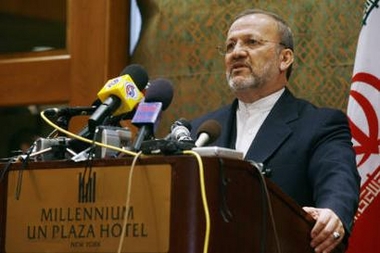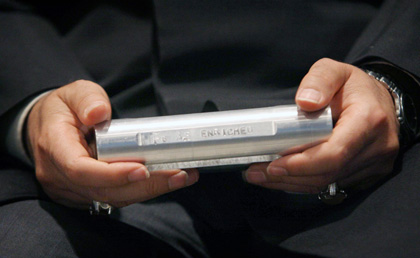Iran partially suspends nuke cooperation
(AP)Updated: 2007-03-26 10:04
TEHRAN, Iran - Iran announced Sunday that it was partially suspending cooperation with the UN nuclear watchdog while hardline President Mahmoud Ahmadinejad said the latest UN sanctions would not halt the country's uranium enrichment "even for a second."
 Iranian Foreign Minister Manouchehr Mottaki speaks during a news conference in New York March 25, 2007. [Reuters]  |
"It is not a new issue for the Iranian nation. Enemies of the Iranian nation have made a mistake this time too," Ahmadinejad said, adding the new sanctions "will not halt Iran's peaceful nuclear program even for a second."
Meanwhile, government spokesman Gholam Hossein Elham said the Cabinet on Sunday decided to suspend "code 1-3 of minor arrangements of the safeguards" with the Vienna-based UN nuclear watchdog, the International Atomic Energy Agency.
The suspension would "continue until Iran's nuclear case is referred back to the IAEA from the UN Security Council," Elham said.
Tehran's scaling back of cooperation with the IAEA was in apparent retaliation for the sanctions unanimously approved by the Security Council over Tehran's refusal to stop enriching uranium, a process that can be used in the production of nuclear weapons.
The West strongly suspects Iran's nuclear activities are aimed at producing weapons though Tehran says they are exclusively for the production of energy.
The UN sanctions are meant to send Tehran a strong message that its defiance will leave it increasingly isolated and open to even tougher penalties.
But Iran remains defiant. The suspension was a response to "Saturday night's illegal and bullying resolution by Security Council," said Elham, adding the government was acting fully within law in the move.
In New York, Iranian Foreign Minister Manouchehr Mottaki said "a few select countries don't have the right to abuse the Security Council" and described the new sanctions as "illegal, unwarranted and unjustified." He said they undermine the credibility of the Security Council.
Mottaki said Iran has repeatedly sought negotiations with the powers that drafted the resolution against his country: the five permanent council members - the US, Britain, France, Russia and China - and Germany. But he accused them of lacking the political will to reach a breakthrough.
"If this political will existed, the other side wouldn't have imposed preconditions on the talks," Mottaki said, referring to demands by the US and its allies that Iran first halt enrichment before they engage in negotiations on its nuclear program.
Mottaki said the world has two options to proceed on the nuclear issue: continued negotiations or confrontation and the resolution was the wrong choice.
"Of course, it will have its own consequences," he said.
In Tehran, citizens brushed off news of the latest sanctions.
"Why should we care about sanctions?" asked Ali Reza, a 21-year-old shopping for a digital camera Sunday with his girlfriend. "We've become accustomed to this kind of news. As long as I can remember, there have been such reports in the air."
Saeed Laylaz, an Iranian political commentator, said that until the sanctions hit normal Iranians like Reza - and the drafters of the UN resolution went to great pains to point out that they did not - Iranians would continue to shrug them off.
"Neither Western people nor Iranians would benefit from such confrontation," said Lida Anvari, who was jogging with her husband in a downtown park. Her husband nodded in agreement, and both said they were fed up with the news.
Elham said that until now, Iran's cooperation with the IAEA went beyond
requirements under the Nuclear Nonproliferation Treaty, which Iran is a
signatory to. He added that Iran has in the past promptly informed the IAEA
about its nuclear plans.
| 1 | 2 |  |
|
||
|
||
|
|

